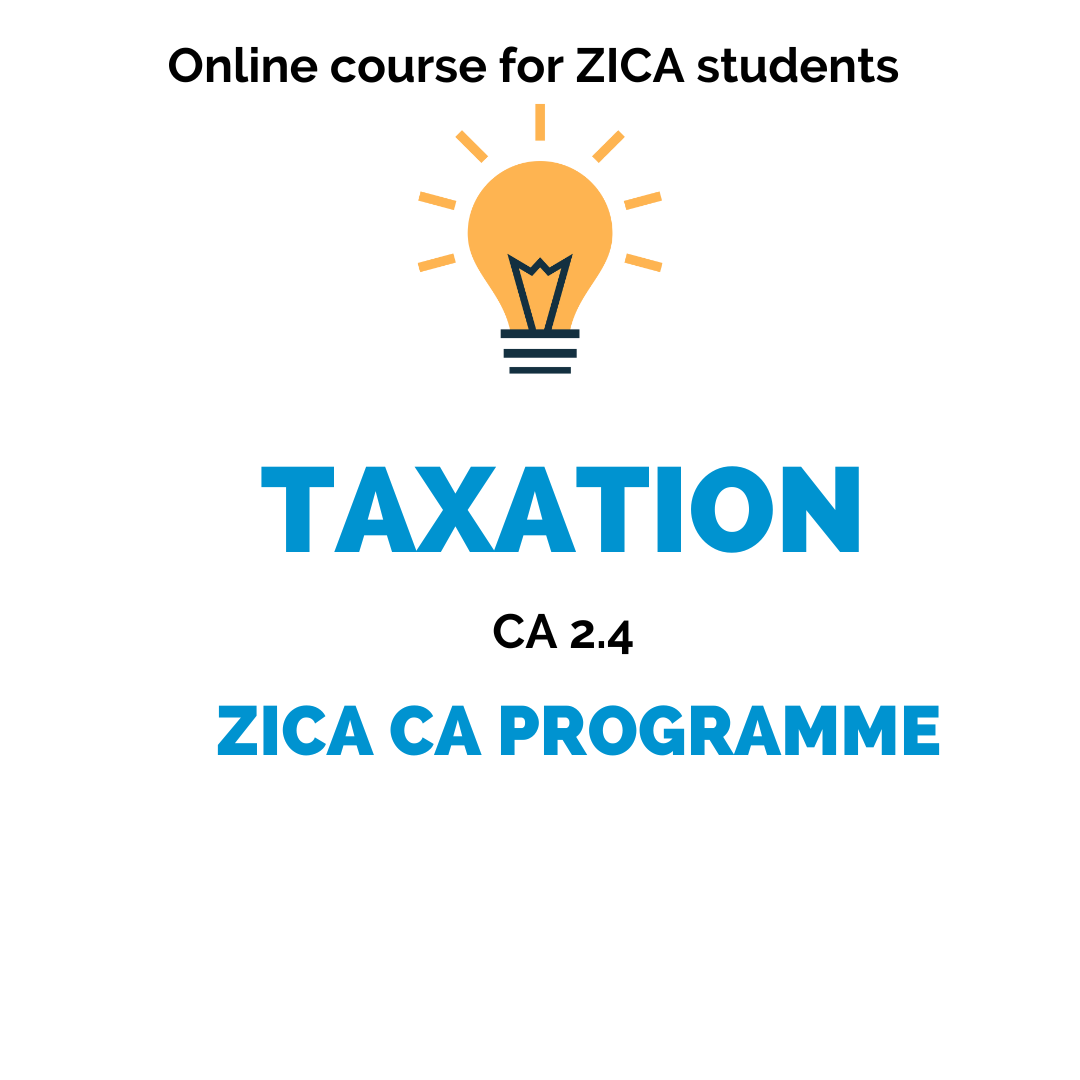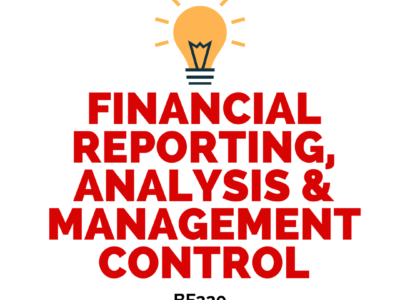CA2.4-Taxation
According to ZICA, on completion of this module, candidates will reach a competency sufficient to be able to:
- Describe the principles and role of taxation
- Calculate tax liabilities for individuals, businesses and companies
- Explain the administrative procedures for direct taxes
- Calculate and account for VAT and Customs and Excise Duties
- Identify and respond appropriately to ethical issues arising in the course of performing tax work
| Syllabus topics | Weighting (%) | LO |
| Tax principles and purpose | 10 | 1 |
| Taxation liabilities for individuals, businesses and companies | 50 | 50 2, 3, 4, 5, 6 and 7 |
| Administrative procedures for direct taxes | 10 | 8 |
| VAT and Customs and Excise | 20 | 9 and 10 |
| Ethical issues arising in the course of performing tax work | 10 | 11 |
Learning outcomes
- LO1: Describe the principles of taxation and explain the role of taxation in the economy
- LO2: Calculate taxable income for unincorporated businesses and compute income tax payable thereon
- LO3: Calculate Income Tax payable on emoluments from employment and advise on how it is paid under the Pay As You Earn system
- LO4: Calculate taxable income from letting of property and calculate withholding tax on all investment income
-
- LO5: Calculate company income tax payable and explain how it is payable
- LO6: Calculate taxable profits from farming and compute income tax payable on farming and fishing income
LO7: Explain the treatment of transfers of value and calculate Property Transfer Tax payable
- LO8: Explain the administrative procedures for direct taxes, including objections and appeals procedure
- LO10: Calculate Customs and Excise duties and advise on the clearing procedure for motor vehicles
- LO11: Explain and apply appropriate ethical standards to taxation practice
- Tax principles and purpose: LO1
- Explain the nature of taxation and the purpose of taxation in Zambia, dealing specifically with:
- The Zambian system of tax
- Qualities of a good tax system
- Function of taxation in the economy
- The role of the Ministry of Finance and the Zambia Revenue Authority
- Classification of taxes
- Taxable and exempt income and gains
- Taxable and exempt persons
- Residence, ordinary residence and domicile and their implications for taxation
- Explain the nature of taxation and the purpose of taxation in Zambia, dealing specifically with:
- Taxation liabilities for individuals, businesses and companies: LO2-7
- Calculate tax liabilities of unincorporated businesses, dealing specifically with:
- Trades, professions and vocations and badges of trade
- Taxable business profits for individual sole traders
- Capital allowances on implements, plant and machinery, industrial buildings and commercial building
- Taxable profits for partnerships and allocation to individual partners
- Accounting dates and basis of assessment, including rules applicable on commencement, cessation and change of accounting date
- Income tax on business profits for sole traders and partners
- Relief for trading losses
- Presumptive taxes
- Calculate taxation of income from employment, dealing specifically with:
- Emoluments, employment and office
- Employment compared with self-employment
- Basis of assessment for emoluments
- Taxable and exempt emoluments
- Taxation of benefits in kind
- Allowable expenses
- Operation of Pay as You Earn system
- Calculate taxation of investment income received by individuals, dealing specifically with:
- Types of investment for individuals and companies
- The withholding tax system
- Taxable income from letting of property and loss relief
- Treatment of income from savings and financial investments
- Treatment of dividends received from Zambian companies
- Calculate taxation of company income, dealing specifically with:
- Residence of a company for income tax purposes
- Business profits for companies
- Investment income received by companies
- Payment of income tax
- Relief for losses incurred by companies
- Taxation of mining operations
- Overseas aspects of Income tax and company tax
- Taxation of group companies
- Calculate taxation of farming enterprises, dealing specifically with:
- Characteristics of farming and fishing enterprises
- Farming profits for individuals and companies
- Capital allowances for farming enterprises
- Relief for losses from farming and fishing businesses
- Averaging of farming and fishing income
- Valuation of livestock
- Calculate Property Transfer Tax, dealing specifically with:
- Meaning of transfer and realised value
- Transfers within groups of companies
- Transfers to members of the immediate family
- Payment of tax
- Calculate tax liabilities of unincorporated businesses, dealing specifically with:
- Administrative procedures for direct taxes: LO8
- Explain the administration of direct taxes, dealing specifically with:
- Comprehensive computation of income tax payable by individuals
- Payment of income tax by individuals
- Payment of income tax by incorporated businesses
- Payment of withholding taxes, Turnover Tax, and Property Transfer Tax
- Objections and appeals procedure
- Role, functions and composition of the Revenue Appeal Tribunal
- Explain the administration of direct taxes, dealing specifically with:
- VAT and Customs and Excise: LO9, 10
- Calculate VAT, dealing specifically with:
- Taxable and exempt supplies for VAT purposes
- Registration and deregistration
- The tax invoice, tax point and tax period
- Recovery of input VAT, pre-registration input VAT and partial exemption
- Bad debt relief
- Special schemes
- VAT inspection/control visits, payment of VAT, submission of VAT returns, penalties and appeals for review
- Duty and reverse tax
- Calculate Customs and Excise due, dealing specifically with:
- Introduction to tariffs and computation of Customs Values (VDP), customs duty and excise duty
- Importation and clearance of motor vehicles
- Valuation principles applicable on imports
- Exports and export concessions
- Rules of origin and tax implications
- Trade agreements and their benefits to the economy
- Payment of Customs and Excise Duties
- Calculate VAT, dealing specifically with:
- Ethical issues in tax practice: LO11
- Explain the IFAC Ethical Code guidance for professional accountants providing taxation services
- Explain how the provision of taxation services creates self-review and advocacy threats
- Explain how the fundamental principles of integrity, objectivity, professional competence and due care, professional behaviour and confidentiality apply when providing taxation services
- Explain the nature of and difference between tax avoidance and tax evasion
Course Features
- Lecture 0
- Quiz 0
- Duration 20 weeks
- Skill level All levels
- Language English
- Students 0
- Certificate No
- Assessments Yes







